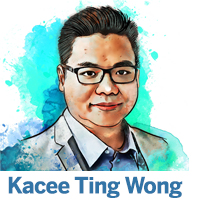Great statesman Deng Xiaoping deserves a lot of credit for setting out the original guidelines for a concerted reform drive at the third plenum of the 11th Communist Party of China Central Committee in December 1978. In the following year, Guangdong and Fujian were authorized to set up special economic zones as a result of the reform and opening-up policies. Hardly any aspect of economic life in Hong Kong was unaffected by the economic metamorphosis in the Pearl River Delta (PRD).

 In addition to grasping the manufacturing opportunities in the PRD, Hong Kong businesspeople were also able to capitalize on these opportunities and transform the city into the premier service hub for South China. Hong Kong’s financial market was given a big boost and the city’s prosperity scaled new heights.
In addition to grasping the manufacturing opportunities in the PRD, Hong Kong businesspeople were also able to capitalize on these opportunities and transform the city into the premier service hub for South China. Hong Kong’s financial market was given a big boost and the city’s prosperity scaled new heights.
Over the past four decades, the third plenums of the CPC Central Committee have played critical roles in China’s economic miracles. Like the third plenum of the 11th CPC Central Committee, the third plenum of the 20th CPC Central Committee has also offered a lot of economic opportunities to Hong Kong.
In the resolution adopted at the recently concluded third plenum, the CPC Central Committee laid out its expectations for the city, including the enhancement of Hong Kong’s status as an international financial, shipping and trade center, creating an international hub for high-caliber talent, and playing a greater role in China’s opening to the outside world.
According to Lau Siu-kai, consultant at the Chinese Association of Hong Kong and Macao Studies, Hong Kong has an edge in its ability to bring in overseas talent, as the city is more culturally diversified and internationalized. He added that the city could become a talent hub for the country. The following discussion will focus on ways to transform Hong Kong into an attractive talent hub.
In 2022, the current administration under Chief Executive John Lee Ka-chiu launched a series of measures that sought to attract fresh talent to work in the city. The policies include the Top Talent Pass Scheme, which is open to applicants who earned more than HK$2.5 million ($320,250) over the past 12 months or are graduates of the world’s top 100 universities. The program has received more than 85,000 applications, with 68,000 being approved, between its launch in late 2022 and May of this year.
We should help this fresh talent unleash its potential in the new environment. High on the talent-trawling agenda is the need to increase the supply of high-paying jobs in the city in order to facilitate their adaptation to new life. Lawmaker Shang Hailong observed a growing demand among high-earning professionals to start their own businesses as they were struggling to find other high-paying jobs, and their expertise had limited demand in the city. These professionals have the confidence to start their businesses in artificial intelligence, biotech, Web3 and new energy. The Hong Kong Special Administrative Region government needs to provide necessary support for these risk-takers to brace the wild entrepreneurial seas.
Hong Kong may consider organizing startup workshops for these potential entrepreneurs. Apart from equipping them with entrepreneurial skills, the organizers can act as go-betweens to help them gain access to local business networks, research facilities in local universities and financial intermediaries in order to help them on their journey to become successful entrepreneurs in the city. If the city succeeds in attracting new talent from Southeast Asia and the Middle East, the startup workshops could provide necessary market information and support for them to establish their business footholds in the Guangdong-Hong Kong-Macao Greater Bay Area.
There are many young-people-led small and medium-sized enterprises in the Asia-Pacific region, and plenty of Southeast Asian startups are booming. Hong Kong can take a leaf out of Singapore’s book by establishing a thriving startup ecosystem in the city. With strong government support, a favorable business environment and a strong talent pool, Singapore has successfully established a thriving startup ecosystem in the city-state. At present, it has about 5,000 startups, 220 incubators and accelerators, and countless headquarters. International players also come to Singapore because of its pro-business environment and access to a diverse talent pool (Merle Kok, Singapore Startups — A 2024 Guide for Corporates, in Agorize, May 8, 2024).
In fact, Singapore has retained its enviable position as the world’s second-most talent-competitive country and the top spot in the Asia-Pacific region, according to the 2023 Global Talent Competitiveness Index. Some effective measures adopted by Singapore to make itself talent-competitive should be brought to the forefront of the current debate on the status of Hong Kong as an international hub for high-end talent.
The SkillsFuture program, which helps young Singaporeans upgrade their skills or learn new ones, has granted businesses access to potential employees with the right capabilities. TechSkills Accelerator, one of the SkillsFuture initiatives, provides a variety of programs to prepare workers for digital and tech roles. Besides, Singapore’s universities have played an important role in providing a diverse talent pool.
Sam Lai Nuen-san is secretary-general of the Society for the Coordination and Promotion of Eastern District, co-director of district administration of the Chinese Dream Think Tank and a district councilor. Kacee Ting Wong is a barrister, part-time researcher of Shenzhen University Hong Kong and Macao Basic Law Research Center, chairman of Chinese Dream Think Tank, and a district councilor.
The views do not necessarily reflect those of China Daily.


